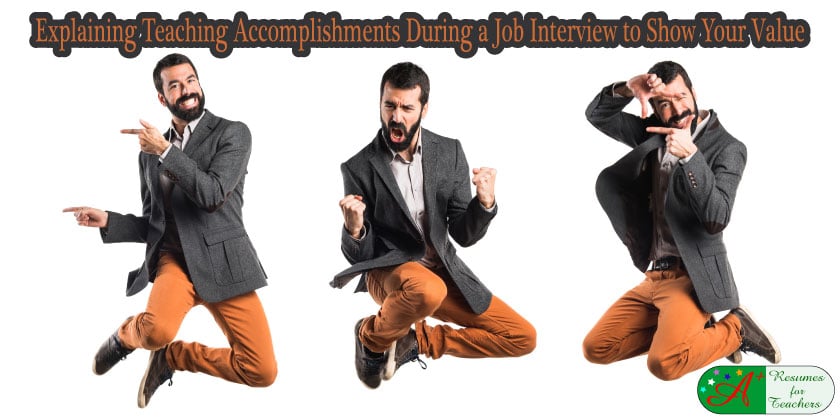Effectively articulating your teaching accomplishments is one of the most critical components of showcasing your value as a candidate when preparing for a teaching job interview. Based on my 24+ years of experience as an interview coach, I’ve observed that many educators struggle to present their achievements confidently. However, with preparation and a clear strategy, you can turn this challenge into an opportunity to shine.
Why Teaching Accomplishments Matter
Teaching is a results-driven profession, and hiring committees want to know how your efforts have made a tangible impact. Highlighting your teaching accomplishments demonstrates your ability to foster student growth, collaborate effectively with colleagues, and contribute to the school community. These successes signal to interviewers that you are not only capable but also passionate about education.
One effective approach is to align your accomplishments with the needs and goals of the specific school district. Researching the district’s strategic objectives, community priorities, and student demographics will help you tailor your responses to show how your skills and experiences align with their vision.
Preparing to Discuss Your Accomplishments
Preparation is key to overcoming nerves and presenting yourself confidently. Follow these steps to prepare effectively:
List Your Achievements: Create a list of your most impactful teaching accomplishments.
These can include:
- Improved student test scores or academic performance.
- Successful implementation of new teaching methods or technology.
- Contributions to extracurricular programs or school initiatives.
- Positive feedback from students, parents, or colleagues.
Quantify Your Successes: Use data to back up your claims whenever possible. For example:
- “Increased class reading comprehension scores by 20% over one academic year.”
- “Reduced behavioral incidents by 30% through classroom management strategies.”
Craft STAR Responses: Use the STAR (Situation, Task, Action, Result) framework to structure your answers. This ensures your responses are clear, concise, and impactful.
Example:
Situation: “At my previous school, many students struggled with reading comprehension.”
Task: “My goal was to improve their literacy skills by implementing a structured reading program.”
Action: “I designed a program incorporating daily guided reading sessions and individualized support.”
Result: “By the end of the semester, 85% of students showed measurable improvement in reading comprehension.”
Addressing Career Transitions or Gaps
If you’re transitioning into teaching from another field or have gaps in your career, prepare to address these topics confidently. Acknowledge the transition or gap, then pivot to how your unique background enhances your teaching abilities.
Example Response for Career Transition:
“I transitioned from a career in corporate training, where I developed and delivered professional development programs. This experience honed my ability to design engaging, learner-focused materials and manage diverse audiences, skills I now use to create inclusive and effective classroom environments.”
Navigating Difficult or Unexpected Questions
Interviews often include questions designed to assess how you handle challenges. Practice responses to questions such as:
- “How do you handle classroom disruptions?”
Example Response:
- “I focus on creating a positive classroom culture where expectations are clear and consistent. When disruptions occur, I address them calmly and privately, aiming to understand the root cause and guide the student back on track.”
- “Can you describe a time when a lesson didn’t go as planned?”
Example Response:
- “In one lesson, my students struggled with a math concept I had introduced. I quickly adapted by breaking the concept into smaller, more digestible steps and incorporating hands-on activities. By the end of the week, the majority of the class had mastered the material.”
If a question catches you off guard, take a moment to gather your thoughts. It’s better to pause briefly than to rush into a poorly considered response.
What to Include in Your Thank-You Letter
A thoughtful thank-you letter is an essential follow-up to your interview. It’s an opportunity to reinforce your qualifications, address any unique circumstances discussed, and leave a lasting impression. Here are key elements to include:
Express Gratitude: Thank the interview panel for their time and the opportunity to interview.
Example:
- “Thank you for taking the time to meet with me and discuss the exciting opportunities at [School Name].”
Reiterate Your Interest: Reaffirm your enthusiasm for the position and highlight why you’re a great fit.
Example:
- “After learning more about [School Name]’s commitment to fostering innovative learning, I’m even more excited about the possibility of contributing my skills to your team.”
Address Unusual Circumstances: If a question or issue arose during the interview that you’d like to clarify or expand upon, use the thank-you letter to do so.
Example:
- “I wanted to revisit our discussion about implementing technology in the classroom. While I haven’t yet implemented a school-wide system, I’ve successfully integrated digital tools like Google Classroom to enhance student engagement.”
Close on a Positive Note: End with a courteous and optimistic statement.
Example:
- “Thank you again for considering my application. I look forward to the possibility of contributing to your team and supporting your students’ success.”
Conclusion
Successfully showcasing your teaching accomplishments in an interview requires preparation, confidence, and adaptability. By understanding your strengths, aligning them with the school’s needs, and presenting them effectively, you can demonstrate your value as an educator. Remember, the goal is to show not only what you’ve done but also how your skills and experiences will benefit the school community moving forward.


